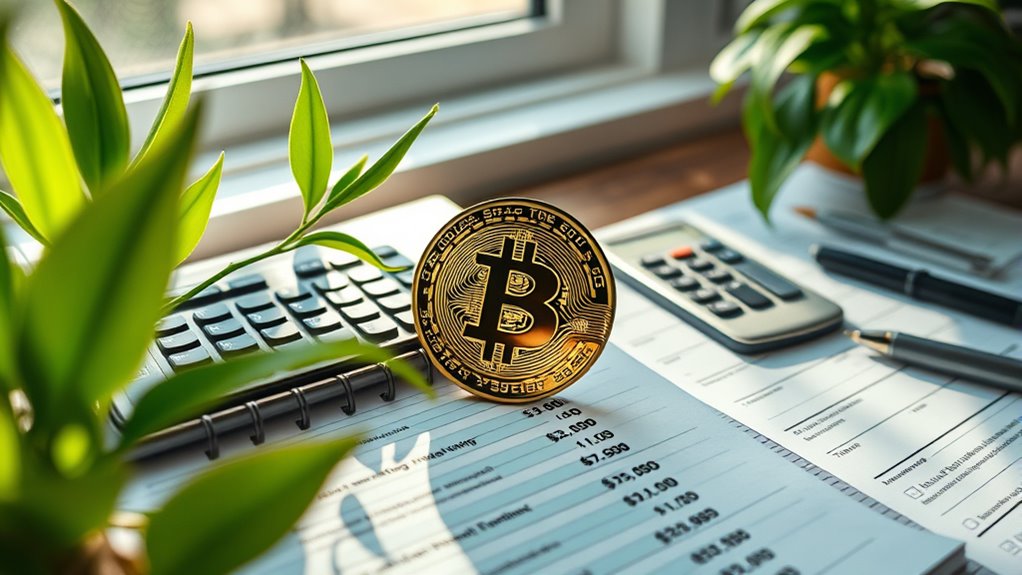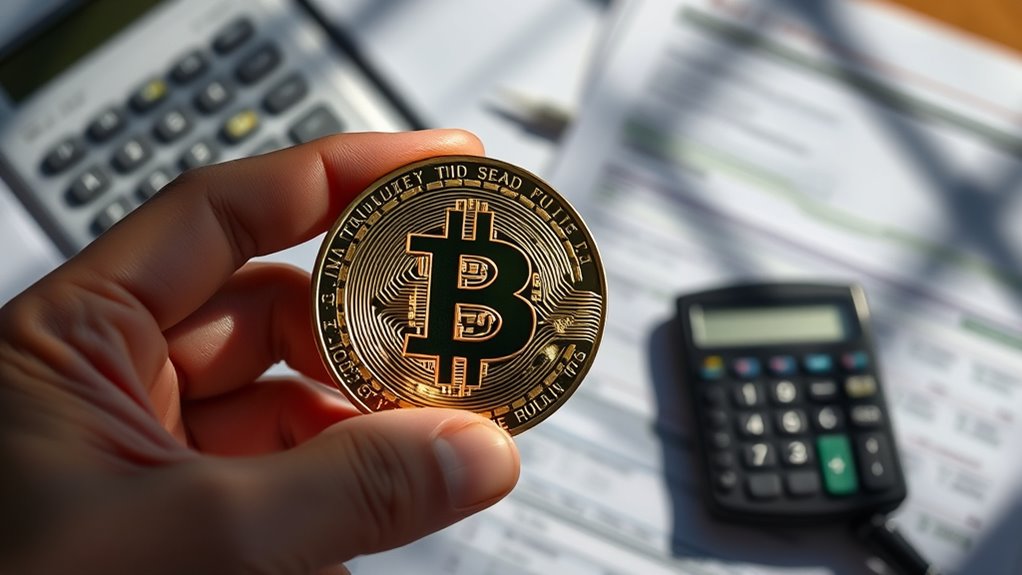As a Bitcoin IRA investor, you should know the IRS classifies cryptocurrency as property. This means gains and losses are treated as capital assets. Inside your IRA, transactions avoid immediate taxation, but personal transfers aren’t allowed. Always use reputable custodians to maintain compliance and safeguard your investments. Be aware of the risks like volatility and scams, and understand the tax implications of staking rewards. There’s more to navigate, so keep exploring these critical considerations.
Key Takeaways
- Cryptocurrency is classified as property by the IRS, affecting tax treatment and compliance requirements for IRAs.
- Gains from crypto transactions within IRAs are not taxable until withdrawal, allowing for tax-deferred growth.
- Personal transfers of cryptocurrency into an IRA are prohibited; transactions must be facilitated by a compliant custodian.
- Accurate record-keeping is essential for reporting crypto holdings and avoiding unexpected tax liabilities, including UBTI risks.
- Staking rewards are tax-deferred in Traditional IRAs and tax-free in Roth IRAs if IRS rules are followed.
Understanding Cryptocurrency as Property for IRA Tax Purposes

When it comes to your IRA, understanding that the IRS classifies cryptocurrency as property rather than currency is vital. This classification impacts how you manage your crypto investments within your IRA. Unlike traditional currencies, gains and losses from crypto are treated under capital asset rules, but this changes when you hold them in an IRA. Inside an IRA, you can avoid immediate tax consequences from buying, selling, or exchanging cryptocurrencies. However, the IRA itself must purchase the crypto; you can’t transfer personal purchases into it. This distinction ensures that your investments are compliant with IRS regulations, allowing for potential tax-deferred or tax-free growth, depending on the type of IRA you choose. Additionally, maintaining a holistic approach to your investment strategy can enhance overall financial well-being.
Tax Advantages of Holding Crypto in an IRA

Holding cryptocurrency in an IRA offers significant tax advantages that can enhance your long-term investment strategy. By leveraging these benefits, you can maximize your returns while minimizing your tax burden. Here are four key advantages to contemplate:
Holding cryptocurrency in an IRA can significantly boost your investment strategy through valuable tax benefits.
- Tax-Deferred Growth: You won’t pay taxes on gains until you withdraw funds from a Traditional IRA.
- Tax-Free Withdrawals: With a Roth IRA, your withdrawals are completely tax-free if certain conditions are met.
- No Immediate Tax Events: Transactions within the IRA, like buying or selling crypto, don’t trigger taxes.
- Potentially Lower Tax Rates: You might access your funds at a lower tax rate during retirement.
Additionally, many investors find that holding crypto in an IRA can protect their assets from market volatility while benefiting from tax incentives. These advantages can make holding crypto in an IRA an attractive option for savvy investors.
Staking Rewards and Their Tax Implications

When you stake cryptocurrency in your IRA, you can enjoy tax-deferred growth, meaning you won’t owe taxes until you withdraw those rewards. If you’re using a Roth IRA, those withdrawals can be tax-free, provided you meet certain criteria. However, be cautious of the potential for unrelated business taxable income (UBTI) if your staking isn’t structured correctly. Additionally, understanding the tax implications of your investment strategies is crucial for maximizing your benefits.
Tax-Deferred Growth Benefits
As you explore the tax-deferred growth benefits of staking rewards within your IRA, it is vital to understand how these rewards are treated under IRS regulations. Staking rewards can provide significant advantages, especially in a Traditional IRA where they grow tax-deferred until withdrawal. Here are key points to keep in mind:
- Tax-Deferred Growth: You won’t owe taxes on staking rewards until you withdraw funds.
- Roth IRA Benefits: Withdrawals from a Roth IRA can be tax-free if rules are followed.
- UBTI Risks: Incorrect structuring may lead to unrelated business taxable income.
- Custodian Compliance: Guarantee your custodian follows IRS-approved structures to minimize tax risks.
Additionally, understanding the importance of custodian compliance is essential as it helps ensure that your investments align with IRS regulations.
Understanding these aspects helps you maximize your investment potential while staying compliant.
Roth IRA Withdrawals
While you may be excited about the potential of staking rewards within your Roth IRA, understanding the tax implications of withdrawals is essential. With a Roth IRA, you can enjoy tax-free withdrawals of your staking rewards, provided you adhere to IRS rules. This means that any growth from your staking activities won’t be taxed when you take it out. However, be mindful of the five-year rule to avoid penalties. Additionally, ensuring that your staking activities comply with IRS regulations can help you maximize your tax benefits.
Here’s a quick overview of Roth IRA withdrawals and staking rewards:
| Aspect | Description | Tax Implication |
|---|---|---|
| Staking Rewards | Earnings from crypto staking | Tax-free if compliant |
| Withdrawal Age | Must be 59½ to withdraw tax-free | Penalties may apply otherwise |
| Five-Year Rule | Must be held for five years | Early withdrawal penalties |
| Contributions | Made with after-tax dollars | No tax on qualified withdrawals |
| Compliance | Follow IRS regulations | Avoid tax penalties |
UBTI Risks Explained
Understanding the implications of unrelated business taxable income (UBTI) is essential for anyone considering staking rewards within a crypto IRA. If your IRA generates UBTI, it could lead to unexpected tax liabilities. Here are four key points to remember:
- Staking rewards in a Traditional IRA grow tax-deferred, but UBTI could change that.
- Roth IRAs allow for tax-free withdrawals, but UBTI may complicate this benefit.
- Incorrect structuring of your IRA for staking can trigger UBTI, resulting in higher taxes.
- Using responsible custodians who understand IRS rules can help minimize these risks. Additionally, it’s crucial to be aware of energy-efficient designs that can help optimize your camping experience while being mindful of your investments.
Risks Associated With Crypto IRAS

Investing in a Crypto IRA might seem appealing, but it carries significant risks that you need to be aware of. First, the high price volatility of cryptocurrencies can lead to substantial losses. Unlike traditional investments, crypto assets lack federal insurance protections, leaving your funds vulnerable. Additionally, the market is rife with fraud schemes such as pump-and-dump tactics that could jeopardize your investment. There’s also the risk of hacking, which can result in the loss of your digital assets with limited legal recourse. In the end, misleading claims about “IRS approved” accounts can lead you into unregulated territory. It’s vital to verify the legitimacy of any Crypto IRA provider and exercise caution before investing. Therefore, understanding state tax rates on IRA distributions is crucial for managing your overall tax liability when considering withdrawals from your Crypto IRA.
Regulatory Warnings on Misleading Claims

As you explore the world of Crypto IRAs, be wary of misleading claims that suggest certain accounts are “IRS approved.” These assertions can lead you into a deceptive landscape where regulatory compliance is often overstated. To protect yourself, keep these points in mind:
- The CFTC has explicitly warned against “IRS approved” crypto accounts.
- High price volatility can profoundly affect your investment’s value.
- Watch for fraud schemes, including pump-and-dump tactics, that can target crypto assets.
- Digital assets stored in IRAs are vulnerable to hacking with limited legal recourse.
- Regularly verify the legitimacy of any claims and avoid falling for false advertisements. Staying informed can help you navigate this complex investment space more safely.
Reporting Requirements for Crypto Transactions in IRAs

While maneuvering the complexities of crypto transactions within IRAs, understanding the reporting requirements that come into play is vital. Unlike personal accounts, you won’t need to report every trade as a taxable event when dealing with crypto in your IRA. This means buying, selling, or exchanging cryptocurrencies won’t trigger immediate tax implications. However, it’s important to keep accurate records of your crypto holdings for valuation and tax basis purposes. If you receive cryptocurrency from a hard fork or an airdrop, you need to report it as ordinary income at its fair market value. Remember, you can’t take personal possession of IRA-held crypto, as doing so may lead to taxable distributions. Additionally, choosing a name that resonates with your dog’s charming personality can make your pet’s presence even more delightful.
Investment and Custodial Considerations for Crypto IRAs

When considering a crypto IRA, you need to make certain your custodian meets compliance requirements to safeguard your investments. Remember, your IRA must directly purchase cryptocurrencies, so using personal funds isn’t an option. As you assess the risks involved, be aware that while crypto can diversify your portfolio, it also carries significant volatility. Additionally, it’s essential to stay informed about increased smartphone usage among various demographics, as this can impact the accessibility of your investment information.
Custodial Compliance Requirements
To guarantee compliance with IRS regulations, custodians managing crypto IRAs must adhere to specific guidelines that safeguard both the investment’s integrity and the account holder’s interests. Ensuring custodial compliance involves several key requirements:
- Direct Purchase: The IRA must directly purchase cryptocurrency, avoiding personal fund transfers.
- Reputable Custodians: Choose custodians who are compliant and experienced in managing digital assets.
- Record Keeping: Maintain accurate records of all transactions and valuations for tax purposes.
- Regulatory Adherence: Stay updated on IRS rules and regulations to avoid potential penalties.
Purchase Method Restrictions
Understanding purchase method restrictions is essential for anyone looking to invest in cryptocurrency through an IRA. You need to guarantee that the IRA itself makes the purchase, as personal funds can’t be transferred later. This means working with a reputable custodian who can facilitate the transaction. Here’s a quick overview of what you should know:
| Purchase Method | Description |
|---|---|
| Direct Purchase | The IRA buys crypto directly with cash. |
| No Personal Transfers | Personal funds can’t be used for IRA assets. |
| Custodian Requirement | Transactions must go through an approved custodian. |
| Self-Directed IRAs | These allow crypto investments but increase complexity. |
Stay informed about these restrictions to maintain compliance and protect your investment.
Investment Risk Assessment
As you explore investment options in cryptocurrency IRAs, it’s crucial to assess the associated risks and custodial considerations. Understanding these factors can help you make informed decisions and protect your investments. Here are four key points to consider:
- Market Volatility: Cryptocurrencies can experience dramatic price swings, impacting your IRA’s value.
- Regulatory Risks: Ensure your custodian complies with IRS regulations to avoid penalties or tax issues.
- Security Concerns: Digital assets can be vulnerable to hacking, so choose a custodian with robust security measures.
- Lack of Insurance: Unlike traditional accounts, crypto IRAs typically don’t have FDIC or SIPC insurance, increasing your financial risk.
Legal and Fiduciary Responsibilities of Crypto IRA Investors

While investing in a Crypto IRA can present unique opportunities for growth, it also comes with significant legal and fiduciary responsibilities. You need to ensure that your investments comply with IRS regulations, as the IRS doesn’t endorse specific crypto investments. As an investor, it’s essential to exercise due diligence and understand the risks involved. You must also keep detailed records of your crypto holdings and transactions for tax purposes. Additionally, avoid falling for misleading claims about tax benefits or regulatory approvals, as these could lead to enforcement actions. Remember, the responsibility for compliance rests squarely on your shoulders, so it’s important to stay informed and act prudently in your investment decisions.
Importance of Reputable Custodians for Crypto Holdings

When you’re managing crypto holdings within an IRA, choosing a reputable custodian is essential. They guarantee regulatory compliance and implement risk mitigation strategies to protect your investments. Plus, understanding custodial fee structures can help you make informed decisions about your retirement savings.
Regulatory Compliance Assurance
Because steering the complexities of cryptocurrency investments can be intimidating, choosing a reputable custodian for your crypto IRA is essential. A trustworthy custodian guarantees your investments comply with IRS regulations, protecting your retirement savings. Here are four key benefits of selecting the right custodian:
- Regulatory Compliance: They keep your investments aligned with IRS rules, minimizing tax risks.
- Security Features: Reputable custodians implement advanced security measures to safeguard your assets from hacking.
- Transparent Fees: You’ll understand all costs upfront, allowing for better financial planning.
- Expert Guidance: They provide knowledgeable support, helping you navigate the complexities of crypto investments.
Risk Mitigation Strategies
Choosing a reputable custodian for your crypto holdings is essential, as it considerably reduces risks associated with volatility and security breaches. A trustworthy custodian ensures that your digital assets are stored securely and managed according to IRS regulations, minimizing the chances of costly mistakes. They help you navigate the complexities of crypto investments, providing valuable insights and support. Additionally, a reputable custodian can protect you from fraud schemes and hacking incidents, which are common in the crypto space. By selecting a reliable custodian, you’re not only safeguarding your investments but also ensuring compliance with tax laws. This proactive approach mitigates risks, allowing you to focus on growing your retirement savings without unnecessary worries.
Custodial Fee Structures
While selecting a custodian for your crypto holdings, understanding their fee structures is essential for effective investment management. A reputable custodian not only safeguards your assets but also provides transparency in fees, ensuring you know what to expect. Here are four common fee types to contemplate:
- Annual Maintenance Fees: Charged yearly for account management and custodial services.
- Transaction Fees: Applied when you buy, sell, or exchange cryptocurrencies within your IRA.
- Withdrawal Fees: Imposed when you withdraw funds or assets from your account.
- Setup Fees: One-time charges for establishing your account and initial transactions.
Choosing a custodian with clear fee structures helps you manage your investments more effectively and avoid unexpected costs.
Strategies for Managing Volatility in Crypto Investments

As you navigate the inherently volatile world of cryptocurrency investments, employing effective strategies can help mitigate risks and enhance your portfolio’s stability. First, consider dollar-cost averaging; by investing a fixed amount regularly, you’ll reduce the impact of market fluctuations. Next, diversify your holdings across different cryptocurrencies to spread risk and avoid heavy losses from a single asset. Additionally, setting stop-loss orders can protect you from significant declines by automatically selling assets at predetermined prices. Keep an eye on market trends and news, as they can influence volatility. Finally, maintaining a long-term perspective can help you ride out short-term market swings and focus on potential future growth.
Frequently Asked Questions
Can I Personally Manage My Crypto Investments in an IRA?
No, you can’t personally manage your crypto investments in an IRA. The IRA itself must make the purchases, and you can’t transfer personal crypto into it. If you’re using a self-directed IRA, a qualified custodian will handle the transactions for you. This setup helps maintain compliance with IRS regulations, but it also means you need to trust the custodian to manage your investments properly. Always ensure they’re reputable and compliant.
What Happens if My Crypto IRA Loses Value?
Did you know that Bitcoin’s price can swing by over 20% in a single day? If your crypto IRA loses value, you won’t face immediate tax consequences because it’s held within the IRA. However, you should monitor your investments closely, as significant losses could impact your retirement savings. When you eventually withdraw funds, your losses might affect your overall capital gains tax situation. Keep track of your holdings and adjust your strategy accordingly!
Are There Minimum Investment Amounts for Crypto IRAS?
Yes, there are typically minimum investment amounts for crypto IRAs, but they can vary depending on the custodian you choose. Some may require a minimum investment of $5,000 or more, while others might be lower. It’s important to check with your chosen provider to understand their specific requirements. Always consider your financial situation and how much you’re willing to invest before committing to a crypto IRA.
How Do I Choose a Crypto IRA Custodian?
Choosing a crypto IRA custodian is like picking a trusted guide for a mountain climb; you want someone experienced and reliable. Start by researching custodians with strong reputations and regulatory compliance. Check their fees, security measures, and customer service. Look for reviews from other investors to gauge their experiences. Remember, the right custodian will safeguard your assets and help you navigate the complexities of investing in cryptocurrency. Don’t rush; it’s an essential decision!
Can I Hold Multiple Cryptocurrencies in One IRA?
Yes, you can hold multiple cryptocurrencies in one IRA. By choosing a self-directed IRA, you gain the flexibility to diversify your investments across various digital assets. Just make sure your chosen custodian permits this flexibility and complies with IRS regulations. Keep in mind that managing multiple cryptocurrencies may require careful tracking and record-keeping to ensure you meet tax obligations and maintain the integrity of your retirement account.
Conclusion
In overview, maneuvering the world of Bitcoin IRAs involves understanding the tax implications, potential risks, and the importance of choosing reputable custodians. For instance, imagine investing in a Bitcoin IRA only to discover you owe significant taxes on staking rewards because you weren’t aware of the rules. Avoid pitfalls like this by staying informed and proactive. By doing your homework, you can make the most of your crypto investments while ensuring compliance with IRS regulations.









